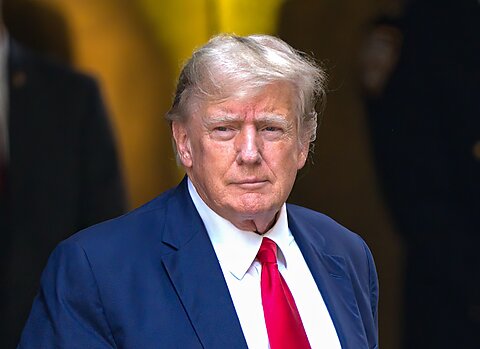
Agree With It or Not, Colorado Supreme Court’s Opinion Disqualifying Trump Is a Triumph of Judicial Engagement
Ever since Will Baude and Michael Paulsen released their watershed law review article, scholars have been debating whether Donald Trump is disqualified from the presidency by virtue of having engaged in “insurrection.” But the discussions have often been less about whether Trump engaged in insurrection than who can and should decide whether he did: can state election officials refuse to put him on the ballot? Should courts be the ones to determine his eligibility? Should Congress refuse to certify the vote if Trump is re‐elected? Should it act earlier? Or should voters decide for themselves? Many people, myself included, believe that it would be better for Trump to lose outright than to lose by being kicked off the ballot by a court, which will only imperil our already imperiled judiciary. But that hasn’t stopped people from trying their hands at lawsuits anyway. Yesterday, the Colorado Supreme Court was the first to take Trump off of a primary ballot. It deemed Trump ineligible, enjoined the Colorado Secretary of State from putting him on the ballot, and all but guaranteed the United States Supreme Court would take up the case. Whether one thinks the Colorado Supreme Court was right or wrong, its lengthy opinion is a triumph of judicial engagement. There’s no doubt it’s a good faith attempt to grapple with a vague constitutional provision. It’s transparent, it’s thorough (213 pages, including the three dissents), it engages with the arguments (all of them, even those that were arguably waived), and it declines to take any of the several available escape hatches that would have allowed the court to shy away from deciding the merits. It is therefore so much more satisfying than most other cases, which manipulate standing doctrine or pick a ripeness, mootness, immunity, or abstention doctrine out of a hat to toss the case out of court. So how did this case get to the court? A group of Republican and unaffiliated electors brought a lawsuit under the Colorado Election Code arguing that the Secretary of State is prohibited from putting Trump on the 2024 Republican presidential primary ballot because he engaged in “insurrection,” which makes him ineligible for office under Section 3 of the Fourteenth Amendment. After a five‐day trial in November, a Denver district court concluded that President Trump had engaged in insurrection as used in Section 3 but, nevertheless, Section 3 did not apply because the presidency is not an “office” under the United States, nor is the president an “officer of the United States” who takes “an oath … to support the Constitution of the United States.” In other words, Section 3 applies to most government officials, but not the chief executive officer of the country. The Colorado Supreme Court affirmed in part and reversed in part, holding that 1) the electors could challenge Trump’s eligibility under the Colorado Election Code based on Section 3; 2) Section 3 is self‐executing and Congress need not pass any legislation for it to apply; 3) the issue was not a political question requiring the court to refrain from deciding the case; 4) the district court was wrong to conclude that Section 3 does not apply to the office of the presidency; 5) the district court did not err in concluding that President Trump committed “insurrection” on January 6, 2021; and 6) Trump’s speech was not protected by the First Amendment. Given how many hurdles the court had to jump through to get to the merits, it’s kind of amazing it did. Take, for example, the very first argument made by Trump: his attorneys argued that the electors could not sue to prevent the Secretary of State from putting him on the ballot because the Secretary has no duty to independently investigate the candidate’s eligibility. Instead, she need only rely on the political party’s statement that the person is their bona fide candidate. This is exactly the type of pedantic argument government attorneys make all the time, but the court wasn’t having it. First, states have the authority to assess the qualifications of presidential candidates. Citing then‐Judge Neil Gorsuch, the court wrote that states have a “legitimate interest in protecting the integrity and practical functioning of the political process” that “permits [them] to exclude from the ballot candidates who are constitutionally prohibited from assuming office.” Second, Colorado election law does not just allow people to challenge the Secretary’s breach of affirmative duties; it allows people to sue for any wrongful act. And it would certainly be wrongful for the Secretary to put an unqualified person on the ballot when the code explicitly states that all candidates must be qualified. The Colorado Supreme Court next dispensed with the argument that taking Trump off of the ballot would violate the free association rights of the Republican Party. If that were true, the court said, it would mean any political party could override the Constitution by putting ineligible people on the ballot (i.e., people who are too young, not a natural born citizen, etc.) and states couldn’t do anything about it. Sure, political parties can pick who they want as their candidates, but that doesn’t mean that states must put the candidate (including ineligible ones) on the ballot. Trump’s team also argued that the expedited procedures required under the Election Code deprived him of due process. But as the court rightly pointed out, that was exactly the type of constitutional argument that Trump argued the other side was making and which can’t be made in this case. Instead, any constitutional challenges (rather than a statutory challenge based on a “wrongful act”) must be brought under the normal jurisdictional rules that apply to constitutional cases. And in any event, election challenges must move quickly given their nature, the procedures in this case were thorough, and Trump did not identify any particular ways in which he was supposedly denied a fair hearing. (Over at Reason, Ilya Somin argues that depriving someone of public office doesn’t deprive them of life, liberty, or property, and therefore the Due Process Clause doesn’t even apply.) The court next spent a lengthy amount of time explaining why Section 3, like the other provisions of the Fourteenth Amendment, is self‐executing (meaning it applies without any further action by Congress). This necessarily required addressing Chief Justice Salmon P. Chase’s opinion in Griffin’s Case. There, Caesar Griffin challenged his criminal conviction on the basis that the judge who had entered his conviction had served as a legislator in Virginia’s Confederate government and was therefore disqualified from holding judicial office under Section 3. Riding circuit shortly after the Civil War, Justice Chase ruled that Section 3 is not self‐executing. He observed that after the Civil War, several southern states had established interim governments out of necessity. If Griffin were right, it would mean that “[n]o sentence, no judgment, no decree, … no official act” issued under those governments “[would be] of the least validity.” He concluded that it would be “impossible to measure the evils which such a construction would add to the calamities which have already fallen upon the people of these states.” Moreover, excluding a class of individuals from office without trial would violate due process. According to the Colorado Supreme Court majority, Chief Justice Chase was dealing with special circumstances that existed during Reconstruction. And anyway, the case is non‐binding and has been consistently criticized. There’s no reason why Section 3 should be treated any differently from the other provisions of the Fourteenth Amendment, which are self‐executing. Congress can pass laws to implement Section 3, but it need not do so—otherwise, it could nullify the Fourteenth Amendment by simply refusing to pass legislation. Next, the court tackled whether the case involved a political question that’s inappropriate for judicial review. Under the political question doctrine, courts refrain from getting involved if there is a “textually demonstrable constitutional commitment of the issue to a coordinate political department; or a lack of judicially discoverable and manageable standards for resolving it.’” The court observed that the Constitution doesn’t say who determines whether a person has engaged in insurrection. Congress is textually authorized to pass implementing regulations, but it is not textually committed to doing so. And the court would not “abdicate its duty” to decide merely because the case has political implications. While Trump did not argue that the case is also nonjusticiable based on a lack of judicially discoverable and manageable standards (and he, therefore, waived any such argument), the court addressed it anyway “in the interest of providing a thorough review.” Determining whether someone has engaged in insurrection, it said, is no different than the type of interpretive questions it must answer in the average constitutional case. And indeed while the term seems vague, courts have interpreted the term “insurrection” in other contexts. “In our view,” the court said, “declining to decide an issue simply because it requires us to address difficult and weighty questions of constitutional interpretation would create a slippery slope that could lead to a prohibited dereliction of our constitutional duty to adjudicate cases that are properly before us.” Whoa! This is one of the best endorsements of judicial engagement to come out of a court opinion in years. The court then determined that Section 3 does apply to the president because (1) the presidency is an “office, civil or military, under the United States”; (2) the president is an “officer of the United States”; and (3) the presidential oath set forth in Article II constitutes an oath “to support the Constitution of the United States.” While the presidency is not explicitly mentioned, the court concluded that was so exactly because the common meaning of “office” so obviously encompasses the presidency, and indeed the Constitution elsewhere refers to the presidency as an office multiple times. Senators, representatives, and electors, by contrast, are explicitly mentioned because they are not officers. Trump had also argued that an earlier version of the Amendment mentioned the presidency, and the framers’ choice to remove it meant they intended to exclude it. But later statements by the framers, the court said, as well as the common meaning of the phrase indicate that the terms “office” and “officer” were intended to encompass the president. Similarly, Trump’s attorneys had argued that Section 3 does not apply to him because it speaks of people who previously took an oath to “support” the Constitution, and the president’s oath required him to “preserve, protect, and defend the Constitution.” But “preserve, protect, and defend,” the court said, is consistent with “support.” In sum, “President Trump asks us to hold that Section Three disqualifies every oathbreaking insurrectionist except the most powerful one and that it bars oath‐breakers from virtually every office, both state and federal, except the highest one in the land. Both results are inconsistent with the plain language and history of Section Three.” Finally, the Court addressed whether Trump had engaged in insurrection, making him ineligible for office. Using contemporaneous dictionary definitions, the district court had concluded that “an insurrection as used in Section Three is (1) a public use of force or threat of force (2) by a group of people (3) to hinder or prevent execution of the Constitution of the United States.” The Colorado Supreme Court acknowledged that there is no precise definition; an insurrection is something more than disturbing the peace, but less than an all‐out rebellion. Nevertheless, “any definition of ‘insurrection’ for purposes of Section Three” would at least include “a concerted and public use of force or threat of force by a group of people to hinder or prevent the U.S. government from taking the actions necessary to accomplish a peaceful transfer of power in this country.” Based on the district court’s extensive factual findings (which can only be overturned based on clear error), that standard was met. For example, there was substantial evidence in the record that even before the November 2020 election, President Trump was “laying the groundwork for a claim that the election was rigged.” Trump invited his supporters to come to Washington on January 6 and, once there, repeatedly called on them to go to the Capitol and “fight like hell.” He told them that, given the circumstances, they weren’t subject to normal rules. They needed to “show strength,” or it would be the end of the country. He then refused to call them off, even when he was aware of the threat of violence. In fact, when told that the Capitol mob was chanting, “Hang Mike Pence,” Trump responded that perhaps the vice president deserved to be hanged. He did not just incite the mob, he continued to “aid the unlawful purpose of stopping the peaceful transfer of power” by demanding that Vice President Pence refuse to perform his constitutional duty, calling senators and demanding that they stop the count, and speaking to his followers. For many hours, he succeeded in his aim of delaying the count. Trump contended that all of that was mere free speech protected by the First Amendment. But using a straightforward incitement test, the court determined that his speech was not protected. Because “(1) the speech explicitly or implicitly encouraged the use of violence or lawless action; (2) the speaker intended that the speech would result in the use of violence or lawless action; and (3) the imminent use of violence or lawless action was the likely result of the speech,” Trump had done nothing less than issue a call to arms. Three justices dissented, but only one did so on constitutional grounds. Two justices believed that the Colorado election code and its expedited judicial hearings were ill‐suited to tackling this complex case. Another justice dissented on the basis that deeming someone ineligible for office through the election code without any congressional action was a due process violation. Congress alone, he said, is empowered to implement Section 3. Whatever one thinks of the outcome, the opinions are clear, easy to read, thorough, and transparent. One hopes that whatever the United States Supreme Court decides, should it take up the case, it similarly engages with the arguments in a way that the advocates and the public deserve.



